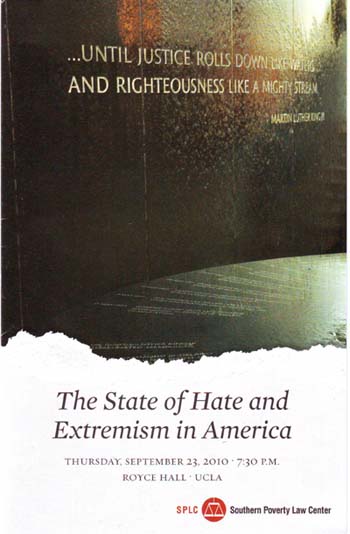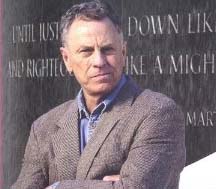
By Neil Earle
Los Angeles, CA – Thursday, September 23, 2010 some 1500 people filled the elegant Royce Hall on the UCLA campus to hear Morris Dees and Richard Cohen of the Southern Poverty Law Center (SPLC) expound on “the state of hate” in the United States.

Since 1970 the SPLC of Montgomery, Alabama, has been a leader in bringing hate groups and hate crime perpetrators to justice and in a practical way. By filing law suits against such groups as the Ku Klux Klan, the United Klans of America, and other neo-Nazi and nativist groups the SPLC has been tagged by some of those very groups as “the single greatest threat to the sponsors of organized violence against minorities and immigrants.”
In 1987 SPLC helped win a civil decision by an all-white jury in Mobile, Alabama that resulted in $7 million charges against the United Klans of America that forced the losers to hand over all its assets in Alabama and its national headquarters in Tuscaloosa. Other victories against paramilitary groups have included a $12.5 million case tried in Oregon. They also won a $28 million verdict in South Carolina against the burners of black churches in the 1990s. Hate knows no boundaries.
This kind of forceful response seems needed more than ever as hate groups and the very young “shock troops” they so nefariously influence has jumped 244% in 2009 alone. There are 932 such organizations at last count and eight law enforcement officials have been murdered by extremists in recent months. There are some 60 hate groups active in the University of California system alone. “The face of hate is changing,” said Cohen. “Recently five white high school kids stabbed a legal immigrant from Ecuador. Since 9/11 Muslim kids hear attacks 24/7 and ask themselves: ‘What are my classmates thinking?’”
Some of this comes back at us in the form of Latino gangs and the circle of violence spreads. “Kids suffer from overly strict penalties,” adds Cohen. “After committing low-level misdemeanors they run from abuse and find worse in jail.” “Bullied,” a recent documentary dealing with the situation in the public schools, referenced by Cohen, addresses this issue as well. Then there is the increased targeting of gays and lesbians.
Cohen has no doubt of the root causes. “Hate groups know that in tough times people listen to their message,“ said Cohen. “Scape-goating escalates. Neo-Nazis claim to be the answer for white people.” And there’s the rub. Says Cohen: “In 1970 the country was 80% white. Today it is more like 66/34% and those demographics are scaring people. The biggest trend in this decade has been anti-Latino fervor.”
And one other major factor as well. Cohen quoted the notorious white supremacist David Dukes as saying that President Barack Obama is a ”visual aid for white people…the country is being stolen by Jews and given to people of color.” The Youth Brigade of a group led by a hostile ex-Marine are actively plotting to kill the Commander-in-Chief. In the meantime SPLC feels that irresponsible and semi-paranoid remarks by influential media figures such as Glenn Beck and Rush Limbaugh are stirring the pot. It is well-known that the architect of the Oklahoma City bombing in 1995 used such excuses as “Well, doesn’t everyone hate the federal government?”

The audience was attentive to Cohen’s remarks. Morris Dees closed out the evening with a story about a white man named James Knowles, one of the young men associated with the lynching of a young black named Michael Donald in March, 1981. Michael Donald was victimized when Klansmen believed that an African-American accused of killing a white policeman was let go by a jury that included some African-Americans. The bitter rhetoric stemming from these adults motivated Henry Hays, the son of Mobile’s KKK leader and Knowles. They found 19-year-old Michael Donald, a local trade school student and worker at the Mobile Press Register, on his way home. They forced him into their care, took him to a neighboring county and lynched him. There was a brief investigation in which local police tried to claim that Michael had been murdered as a result of a drug deal.
This incensed Michael’s mother, Beulah Mae Donald. She knew her son was no drug dealer. After a protest march led by Jesse Jackson and follow-up work by the FBI, James Knowles confessed to his part in the murder. In June 1983, Knowles was sentenced to life imprisonment. Six months later Henry Hays was tried for murder and Knowles appeared as a prosecution witness. When Knowles pointed out the older Klan ringleaders in court their defence was: “He’s just a boy. We’re not responsible for the actions of our young members.”
Then, according to Morris Dees’ retelling, Knowles turned dramatically to address Michael’s mother, Beulah May Donald. She had sat through the whole grisly trial. “How can you ever forgive me?” James said. “Son, I’ve already forgiven you,” Beulah May Donald replied. “There wasn’t a dry eye in that courtroom,” Morris Dees concluded, “Beulah May knew that James too was a victim. She also knew that there was a higher justice active in that courtroom, one based on love and tolerance.”
Henry Hays was executed in 1997. He was the first white man executed for a crime against an African-American since 1913. But the exchange between Beulah May Donald and James Knowles is a parable in the old biblical theme that mercy rejoices against justice (James 2:13). May it ever be so.
Neil Earle edits “Reconcile,” a newsletter dedicated to social justice issues and authored the DVD “A Time to Reconcile” available upon request at atimetoreconcile.org.